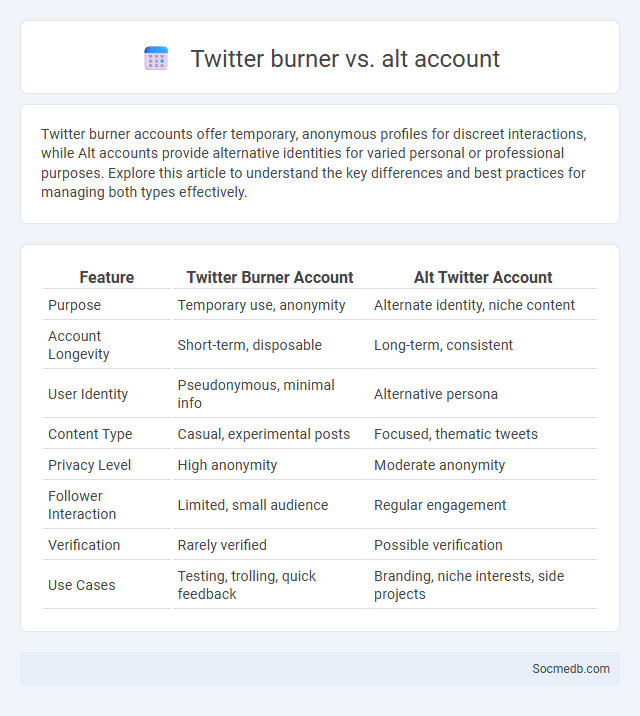
Photo illustration: Twitter burner vs Alt account
Twitter burner accounts offer temporary, anonymous profiles for discreet interactions, while Alt accounts provide alternative identities for varied personal or professional purposes. Explore this article to understand the key differences and best practices for managing both types effectively.
Table of Comparison
| Feature | Twitter Burner Account | Alt Twitter Account |
|---|---|---|
| Purpose | Temporary use, anonymity | Alternate identity, niche content |
| Account Longevity | Short-term, disposable | Long-term, consistent |
| User Identity | Pseudonymous, minimal info | Alternative persona |
| Content Type | Casual, experimental posts | Focused, thematic tweets |
| Privacy Level | High anonymity | Moderate anonymity |
| Follower Interaction | Limited, small audience | Regular engagement |
| Verification | Rarely verified | Possible verification |
| Use Cases | Testing, trolling, quick feedback | Branding, niche interests, side projects |
Understanding Twitter Burner Accounts
Twitter burner accounts are anonymous or secondary profiles created to protect user identity, often used for candid expression or testing content strategies. These accounts help users engage with communities or follow topics discreetly, avoiding the risks of their main profile exposure. Understanding their role is crucial for marketers and individuals managing digital privacy and influence on social media platforms.
What Is an Alt Account on Twitter?
An alt account on Twitter is a secondary profile created by a user to share opinions, content, or engage with communities without linking back to their primary identity. These accounts are often used for anonymity, experimentation, or exploring niche interests, allowing you to separate personal and public personas. Managing alt accounts can help maintain privacy while navigating diverse conversations on social media.
Key Differences: Burner Vs Alt Account
Burner accounts are temporary social media profiles used for anonymity, often discarded after a short period, while alt accounts are alternative profiles managed alongside a main account for varied purposes like testing content or engaging with different communities. Burner accounts prioritize privacy and short-term use, whereas alt accounts emphasize maintaining a long-term presence with a distinct identity. Social media users leverage burner accounts for discreet interactions, while alt accounts facilitate brand diversification and audience segmentation.
Reasons People Use Burner Accounts
People use burner accounts on social media to maintain privacy and separate personal identity from online activities, protecting themselves from potential harassment or data misuse. These accounts enable individuals to explore sensitive topics, express opinions freely, or manage multiple social personas without linking back to their main profiles. Your ability to control online presence and safeguard your information makes burner accounts a valuable tool for navigating social platforms discreetly.
Why Users Create Alt Accounts
Users create alt accounts on social media to maintain privacy, explore different personas, or engage with content without affecting their primary profile's reputation. These alternate profiles allow you to separate professional and personal interactions, reducing the risk of online harassment or judgment. Alt accounts also enable experimentation with new ideas or communities while preserving anonymity.
Privacy and Anonymity: Burner vs Alt
Social media platforms increasingly emphasize privacy and anonymity, driving users to adopt tools like burner accounts and alternate (alt) profiles to protect personal information. Burner accounts offer temporary, disposable identities ideal for short-term interactions without linking to permanent data, whereas alt profiles allow sustained anonymous engagement while segregating online personas. Effective management of these options helps users maintain control over digital footprints and minimize risks related to data breaches and identity exposure.
Risks and Downsides of Burner Accounts
Burner accounts on social media pose significant privacy risks, as they can be exploited for cyberbullying, misinformation, and fraudulent activities. Your anonymity might encourage deceptive behavior, leading to damaged reputations and trust issues among online communities. These accounts also complicate platform accountability, making it harder to trace malicious actions or enforce community guidelines effectively.
Ethical Concerns: Alt vs Burner Usage
Using alternative or burner social media accounts raises significant ethical concerns related to transparency, accountability, and trustworthiness. These accounts can facilitate anonymity that sometimes leads to harassment, misinformation, or the evasion of social responsibility. You should consider the impact of such practices on online community integrity and personal digital ethics.
Managing Multiple Twitter Identities
Managing multiple Twitter identities requires strategic organization, including using dedicated management tools like TweetDeck or Hootsuite to schedule posts and monitor interactions efficiently. Clear differentiation of brand voices and content themes across accounts enhances audience targeting and engagement without causing confusion. Consistent analytics review helps optimize performance and tailor messaging for each distinct Twitter profile.
Choosing Between Burner and Alt Accounts
Choosing between burner and alt accounts depends on your specific privacy needs and online activities. Burner accounts offer temporary anonymity ideal for one-time use or sensitive transactions, while alt accounts provide long-term alternatives that help manage different personas or testing social media strategies. Assess your goals to determine which option best protects your identity and supports your social media engagement.
 socmedb.com
socmedb.com